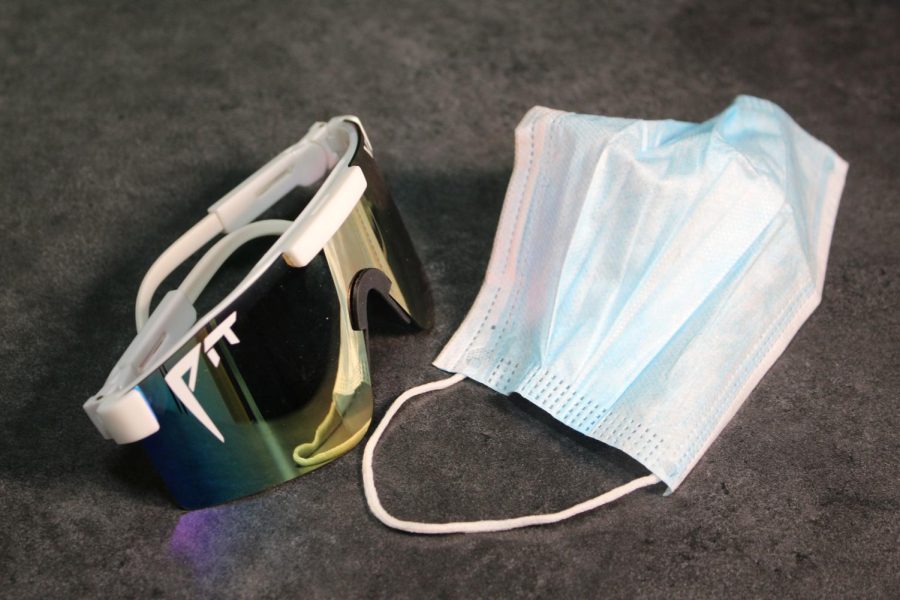Opinion: COVID isn’t over — even if you’re over it
Even with the mask mandate lifted in Illinois, traveling during spring break could be a recipe for another COVID-19 spike
Everyone is ready for COVID to be over so they can enjoy their spring break for the first time in three years. But if we don’t put health and safety first, the virus could come back just in time to spoil the end of the semester.
March 25, 2022
People are all over COVID, as it first broke out in the U.S. over two years ago, but the pandemic isn’t over yet. Pandemic or not, spring break is here. Vacationers are eager to travel again for the week of spring break, yet health officials are unsure if it’s still safe enough with all the eased mandates all over the country. But the pandemic isn’t over yet and could strike again, so spring breakers should still beware.
As Illinois along with many other states’ mask mandates were lifted, a sense of normality could be soon as people are most likely to be traveling over spring break again. The coastal highly visited states by spring breakers such as the Carolinas, Virginia, New Jersey and California have between 5.0-12.5 cases of Covid per 100K people. With the increase of travel and the lifting and easing of mask mandates in larger crowds, it could create another large Covid spike during the week of Spring Break.
There still needs to be some caution around traveling over Spring Break so that the number of new cases do not spike like over winter break. The CDC says on its website that they require masks over the nose and mouth in indoor areas of transportation (airplanes) and indoor U.S. transportation locations (airports) while also getting tested before and after a domestic trip if one’s not up to date on COVID-19 vaccines.
Yet, many of the popularly visited coastal states mentioned before and are still at a high-risk for COVID19. So if people traveled and disregarded covid cautions, there is a high probably for a spread of COVID. According to epidemiological data compiled by the nonprofit CovidActNow.org on Mar. 15, “The US saw a daily average of nearly 37,000 new cases of COVID-19 during the past week” . And these numbers are making officials raise their concerns about travel within the U.S. as well as abroad. Because of the uncertainty of covid numbers we really should not travel throughout both flu season as well as an ongoing pandemic.![]() Loading ...
Loading ...
Lifting the mask mandates might be another step closer to “normal,” but having large crowds in enclosed public spaces without masks are going to cause COVID to spread more as larger crowds are going to encourage the spread. Thus, causing more outbreaks. Health officials advise that vacationers continue to wear masks indoors while on vacation, especially in busy establishments and anywhere where vaccine uptake is low.
If people choose not to wear a mask, that is perfectly fine but people should not travel think/are sick, tested positive for COVID-19, or had close contact with a person with COVID-19. This one is a no-brainer, in order to keep families and others safe, being cautious of others to not spread the virus to others during travel, especially the Covid variants such as Omicron. Even health officials from Florida say, “So the Omicron [BA.2] is around. Strains have been detected in the US. That’s one of the major things that I’ll be watching for, just to see if that variant is picking up speed.” They encourage people to be cautious of large crowds in indoor establishments for those who don’t have the luxury to get vaccinated.
Vacationers shouldn’t tested before and after traveling and be up to date on the COVID vaccines. Yeah, it seems annoying to test and wait for results before and after departure but it is the most effective way to prevent the spread of COVID any further. Even the CDC recommends to, “get tested with a viral test as close to the time of departure as possible (no more than 3 days) before you travel and get tested with a viral test 3-5 days after returning from travel. Stay home and self-quarantine for a full 5 days after travel.” This caution needs to be taken seriously as these tests can prevent the further spread before symptoms surface and after it starts, during travel.
Overall, deaths and cases from COVID-19 are falling nationwide, but some researchers expect those numbers to creep up again as mask mandates are lifted. Airlines and summer events such as concerts also do not require vaccination or masks so people are free to enjoy a lot of summer events without the hassle of masks, vaccination or limit of crowds. Yet this new liberty is what is the real concern.
We need to understand what activities are really necessary to do right now and which ones are not. Yeah we are sick of being stuck at home, but understand there are activities that are much, much safer and much less likely to be crowded with people so that we can officially call this pandemic over and keep others safe.












